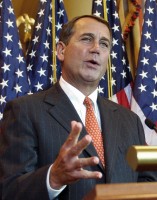Yesterday was a big day for women’s issues in Washington. President Obama announced the formation of an interagency advisory council on women and girls, headed up by Valerie Jarrett to help coordinate policy across government; the official release states that “The mission of the Council will be to provide a coordinated federal response to the challenges confronted by women and girls and to ensure that all Cabinet and Cabinet-level agencies consider how their policies and programs impact women and families.”
The president spoke in personal terms about his motivation for the council’s creation:
“I sign this order not just as a President, but as a son, a grandson, a husband, and a father, because growing up, I saw my mother put herself through school and follow her passion for helping others. But I also saw how she struggled to raise me and my sister on her own, worrying about how she’d pay the bills and educate herself and provide for us.
I saw my grandmother work her way up to become one of the first women bank vice presidents in the state of Hawaii, but I also saw how she hit a glass ceiling — how men no more qualified than she was kept moving up the corporate ladder ahead of her.
I’ve seen Michelle, the rock of the Obama family, – juggling work and parenting with more skill and grace than anybody that I know. But I also saw how it tore at her at times, how sometimes when she was with the girls she was worrying about work, and when she was at work she was worrying about the girls. It’s a feeling that I share every day.
In so many ways, the stories of the women in my life reflect the broader story of women in this country — a story of both unyielding progress and also untapped potential.”
Meanwhile at State, First Lady Michelle Obama joined Secretary Clinton at the 3rd annual International Women of Courage awards, honoring women from around the world who are working — often against tough odds — to advance women’s rights in their home countries.
In the words of one of the honorees, Ambiga Sreenevasan of the Malaysian Bar,
This award has given us the opportunity which we would not otherwise have had, to share our stories, our successes, our failures, to reach out across our borders and to establish a base upon which we can build a meaningful network of support. These stories must be told in all our countries. By this experience, we are both enriched and enraged; enriched by what we have shared, and enraged that so many of our sisters endure intimidation and suffering in their countries. Nevertheless, ours is a message of hope that something has been achieved, despite the odds.
And over the weekend, the president also announced the appointment of Melanne Verveer to head up the State Department’s first-ever ambassador-at-large for Global Women’s Issues. Melanne is well equipped for the job, having spent the past decade heading up the Vital Voices Global Partnership, which supports emerging women leaders in countries around the world.
 With the thrill of passing a trillion dollar porkapalooza bill past them, it seems many Democrats are getting that queasy, hangover feeling as they wake up to the realization that they’re going to have to take responsibility for the consequences of their actions.
With the thrill of passing a trillion dollar porkapalooza bill past them, it seems many Democrats are getting that queasy, hangover feeling as they wake up to the realization that they’re going to have to take responsibility for the consequences of their actions. Apparently Senate minority leader Mitch McConnell has been listening to some
Apparently Senate minority leader Mitch McConnell has been listening to some